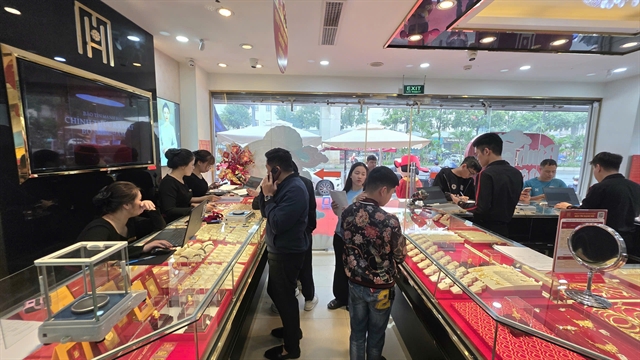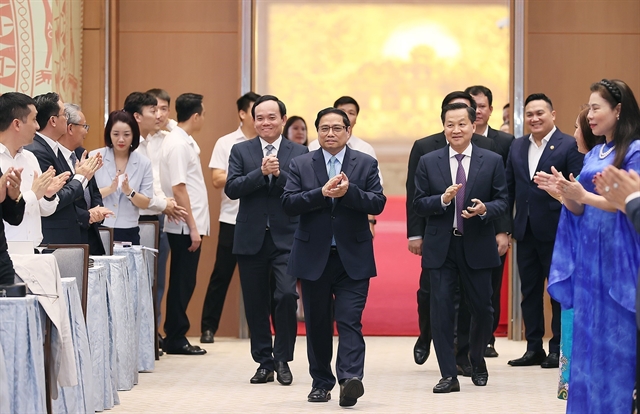 Economy
Economy


|
| Prime Minister Phạm Minh Chính on Wednesday afternoon met with Vietnamese enterprises on the 19th anniversary of the Vietnamese Entrepreneurs’ Day on October 13. — VNA/VNS Photo Dương Giang |
HÀ NỘI — Businesses should continuously improve their competitiveness to reach regional and international levels and strengthen cooperation to elevate the position of Vietnamese firms.
That was a message of Prime Minister Phạm Minh Chính during a meeting with Vietnamese entrepreneurs on the 19th anniversary of the Vietnamese Entrepreneurs’ Day on October 13.
He said firms should proactively innovate production and restructure business models towards the green economy, digital economy, and circular economy in addition to developing their brands, enhancing product diversification, and expanding their markets.
The PM affirmed that the State would stand side by side with businesses and business associations and facilitate their development.
In the future, the Government would continue to stabilise the macroeconomy, control inflation and stimulate the economic growth.
Top priority would also be given to ensuring a fair, open and transparent investment and business environment, abolishing unnecessary barriers and regulations on business conditions and improving national competitiveness, the PM emphasised.
He added that reviewing and promptly handling long-standing problems that hinder business operations, facilitating their access to credit sources and enhancing implementation of policies to support businesses would be also included.
During the event, chairman of Việt Nam Chamber of Commerce and Industry Phạm Tấn Công said the local business community was entering a new period with the aspiration of turning Việt Nam into a developed, high-income economy by 2045.
He said that the global and Vietnamese economies were facing a number of difficulties, but if overcome, unprecedented opportunities would emerge for Việt Nam to participate and gain new positions in international value chains, Công said.
“The disruption and rearrangement of international supply chains after the COVID-19 pandemic and geopolitical conflicts are creating a rare opportunity for Việt Nam to attract investors and receive new capital and technology flows which are searching for new destinations,” he said.
He stressed that to take this unprecedented opportunity to create an economic growth breakthrough, it was necessary to awaken the entrepreneurial spirit and dare-to-do spirit which was an endless resource and traditional strength of Việt Nam.
What enterprises wanted the most was to improve access to credit while bringing the real estate back on track together, Công said. In the long term, enterprises expected policies that would promote restructuring towards sustainable development, including improving human resource quality, action plans to enhance the capacity of taking advantage of FTAs, upgrading logistics infrastructure, simplifying administrative procedures, hastening reforms, and improving the business environment.
Minister of Planning and Investment Nguyễn Chí Dũng said that enterprises expected more drastic measures from the Government to enable them to overcome challenges and seize opportunities for stronger development.
Dũng said that stable macro-economic situations, improved business environment, opportunities from emerging economic sectors such as digital economy, green economy and circular economy, opportunities from 16 free trade agreements and leveraged position of Việt Nam in the global market which were advantages for Việt Nam to further engage in global value chains and enhance competitiveness.
There were challenges, however, Dũng said, pointing out the pressure from difficult export markets, rising input costs, and increased application of in-trade defence measures.
Focus would be placed on removing legal bottlenecks to create a favourable climate for enterprises, such as regulations on fire preventing and fighting and specialised checks for customs clearance, Dũng said, adding that reforms would be hastened to simplify business prerequisites and administrative procedures.
In addition, support would be provided to enterprises to reduce cost burdens and improve accessibility to capital and other support resources, he said, adding tax policies would be reviewed comprehensively to raise incentive policies for investments in green development, digital transformation, and small and medium-sized enterprises.
The credit flow would be directed to production and business, especially prioritised sectors, together with efforts to lower interest rates and speed up the disbursement of preferential lending packages.
Dũng said that close watch would be placed on the developments in major markets to provide instructions to enterprises to take advantages of new-generation FTAs to expand markets and increase exports.
Policies to encourage digital transformation, innovation, and sustainable business models at enterprises would also be promoted, he stressed.
Dũng urged enterprises to uphold the national spirit, promote innovation and self-reliance, apply science and technology, and improve governance capacity to expand international reach.
With concerted efforts from both the Government and the business community, Việt Nam was capable of making a breakthrough and creating a new position in the face of global challenges, he said.
Join to create synergy
In the morning, VCCI joined the Việt Nam Association of SMEs to organise a national conference where business association leaders and entrepreneurs met to celebrate the Vietnamese Entrepreneurs’ Day.
At the conference, Công called on business associations and enterprises to pool resources to create synergy, enhance competitiveness and boost innovation to become a core force in implementing industrialisation and modernisation, and building an independent, self-reliant, and prosperous economy.
Vietnamese entrepreneurs and businesses need to seize opportunities from the new economic order and new development trends such as green economy, digital economy and circular economy, he said.
Along with that, they must equip themselves with a business cultural identity for successful international integration and sustainable development, Công stressed.
He said: “Business ethics was a core element to build a business culture – a fundamental factor for sustainable business development and contribute to realising the goal of making VIệt Nam a developed and high-income country by 2045.”
Deputy Head of the Party Central Committee’s Economic Commission Đỗ Ngọc An said that the Party’s General Secretary Nguyễn Phú Trọng on Tuesday signed Resolution No 41-NQ-TW on building and developing the contingent of Vietnamese entrepreneurs in the new period.
An said that the resolution would provide a firm ground to accelerate the development of Vietnamese entrepreneurs and businesses – the core force to drive the country’s industrialisation, modernisation, and international integration and develop an independent, self-reliant economy, ensure national defence and security.
Under the resolution, Việt Nam aimed to increase the role of the Vietnamese entrepreneurs with some enterprises playing key roles in the global supply and value chains.
Participants also discussed measures to develop the contingent of entrepreneurs, build up the Vietnamese business community, and improve operational efficiency and cooperation between business associations.
There were nearly 900,000 private enterprises in Việt Nam, which together with foreign-invested enterprises and cooperatives contributed significantly to promoting the country’s socio-economic development, bringing Việt Nam to the world’s top 40 countries in term of gross domestic product, top 20 in international trade and increasing GDP per capita to US$4,110 in 2022, 48 times higher than 1986.
Currently, there are 2-3 million entrepreneurs who are business leaders; and the figure can reach 10 million people if the number of household businesses are taken into account, which is a special workforce playing an important role in implementing national industrialisation and modernisation and building the country's independent, self-reliant and integrated economy in the new era. — VNS